

Fukuyma - th post-Washigton cosensus. What Goes Around, Comes Around: the eurozone crisis, the BRICS and the IMF. Ilene Grabel From 1980s through the early 2000s developing countries faced repeated demands to get their financial houses in order as a condition of financial assistance from the international financial institutions (IFIs) and the world’s leading economies.
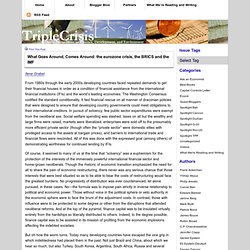
The Washington Consensus codified the standard conditionality. It tied financial rescue on all manner of draconian policies that were designed to ensure that developing country governments could meet obligations to their international creditors. In pursuit of solvency, few public sector expenditures were exempt from the neoliberal axe. Social welfare spending was slashed, taxes on all but the wealthy and large firms were raised, markets were liberalized, enterprises were sold off to the presumably more efficient private sector (though often the “private sector” were domestic elites with privileged access to the assets at bargain prices), and barriers to international trade and financial flows were rescinded.
ShareThis. Why Burma Shouldn’t Listen to the IMF - By Rick Rowden. Burma is at a crossroads.
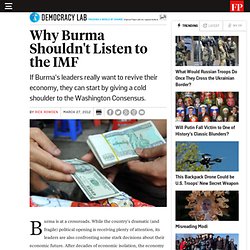
While the country's dramatic (and fragile) political opening is receiving plenty of attention, its leaders are also confronting some stark decisions about their economic future. After decades of economic isolation, the economy of Burma (also known as Myanmar) is badly in need of reforms than can better promote development.
We've yet to kill off the Washington consensus. If the Washington consensus policies are truly dead, then in addition to calling for more overseas aid to meet the millennium development goals (MDGs), readers of this blog should also tell their governments to stop having their representatives on the executive boards of the International Monetary Fund (IMF) and World Bank regularly approve loans with conditions that keep the consensus alive.

Over the last few years, we have heard various claims about the state of Washington consensus policies (fiscal discipline, cutting tax rates, interest rate liberalisation, competitive exchange rates, trade liberalisation, liberalisation of capital flows, privatisation and deregulation of prices and markets). We've been told that the policies have been "damaged", but are still essentially sound, and discredited, and that now we are living in post-Washington consensus world. Others, however, have rightly questioned if a real break with the past is truly at hand.
"free-market" fundamentalism. Mass privatization put former communist countries on road to bankruptcy, corruption. Public release date: 29-Mar-2012 [ Print | E-mail Share ] [ Close Window ] Contact: Daniel Fowlerpubinfo@asanet.org 202-527-7885American Sociological Association WASHINGTON, DC -- A new analysis showing how the radical policies advocated by western economists helped to bankrupt Russia and other former Soviet countries after the Cold War has been released by researchers.
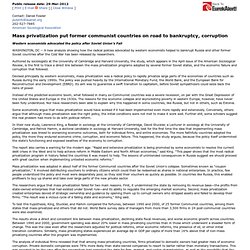
WORLD Markets Cant Self-Regulate; State Should Step In - UNCTAD. GENEVA, May 12 (IPS) - The Washington Consensus is dead and the state must play a new role in development. The triple crises – economy, food and climate – show the need for a new developmental model as export-led growth and financial speculation in agricultural markets have proven to be disastrous. Neoliberal Egypt: The hijacked revolution. London, United Kingdom - The ouster of Hosni Mubarak in February 2011 set off a spate of political reforms in Egypt culminating in the recent parliamentary elections and the ascent of the Muslim Brotherhood's Freedom and Justice Party.

Yet the meaning of the 2011 "revolution" remains far from decided. When Egyptians rose up last year, it was not only against tyranny and political repression, but also against the neoliberal economic order - designed by the United States - that has generated hunger, poverty and inequality in Egypt since the 1980s. For most people, these latter concerns were at least as pressing as the former, though they have been completely obscured in the prevailing media discourse. Now the tragedy is that, when it comes to economic policy, Egypt’s new rulers seem set to reproduce more of the same. Neoliberalism - perspectives... The end of the 'Washington consensus' Workers on the Panama canal; Colombia is now in negotiations with China to build a rival trade route.
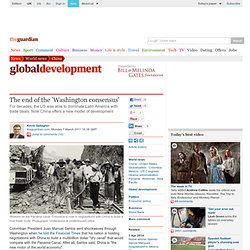
Photograph: Underwood & Underwood/Corbis Colombian President Juan Manuel Santos sent shockwaves through Washington when he told the Financial Times that his nation is holding negotiations with China to build a multibillion dollar "dry canal" that would compete with the Panama Canal. After all, Santos said, China is "the new motor of the world economy". This deal is charged with politics.
Colombia is trying to get the US to pass a long-stalled trade deal. But that's all water under the isthmus. Whether or not this deal goes through, it highlights the stark contrast between China's foreign economic ventures and those of the United States. For 30 years, Washington has been shopping a trade-not-aid based economic diplomacy across Latin America and beyond. The signature trade treaty, of course, was the North American Free Trade Agreement (Nafta). Washington Consensus. The phrase “Washington Consensus” is today a very popular and often pilloried term in debates about trade and development.
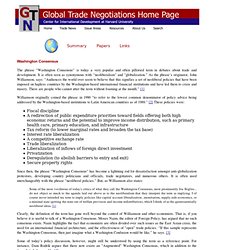
It is often seen as synonymous with “neoliberalism” and “globalization.”